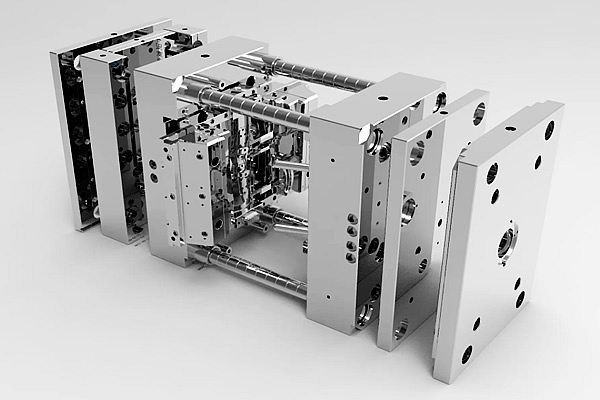
1. Accurate definition of mold partsCustomized molded parts refer to injection molded products that come into direct contact with plastic. For example, cavities, rock cores, sliders, inserts, inclined roofs, and side pumps.
2. The importance of mold component materialsThe precise material of mold parts is directly related to the quality and service life of injection molds. It also determines the appearance and internal quality of the molded parts. Precision mold parts manufacturers must be cautious when selecting materials. Generally speaking, we choose based on the characteristics of injection molded products and molds. All of these should be based on the contract and customer needs.
3. Principle of Material Selection for Mold PartsThe selection principle for precision mold components is based on the type of plastic injection molded product. For example, shape, dimensional accuracy, appearance quality, usage rules, quantity, etc. In addition, precision mold component manufacturers will also consider the cutting, polishing, welding, corrosion, deformation, and wear resistance of materials. At the same time, we need to consider the economy, injection mold manufacturing conditions, and processing methods to choose different types of steel.
4. Transparent injection moldIf the customer needs a mold to form transparent plastic injection molded products, the mold manufacturing company will provide assistance. The cavity and core are made of high-quality imported steel with high mirror polishing performance. For example, 718 (P20 Ni grade), NAK80 (P21 grade), S136 (420 grade), h13 grade steel, etc. Among them, 718 and NAK80 are in a pre hardened state and do not require heat treatment. S136 and h13 steels are in an annealed state, with a hardness generally of hb160-200. After rough machining, vacuum quenching and tempering treatment is required. The hardness of S136 steel is generally hrc40-50, while the hardness of h13 steel is generally hrc45-55 (depending on the specific grade).
5. Products with high appearance quality of moldsThere are molds with high requirements for appearance quality, long service life, and large-scale production, and mold suppliers provide support for selecting materials for formed parts.
a. The mold cavity is made of high-grade imported steel with high mirror polishing performance. For example, 718 (P20 Ni grade), NAK80 (P21 grade), etc., are all pre hardened and do not require heat treatment.
b. The iron core is made of medium to low grade P20 or P20 Ni grade steel, such as 618, 738, 2738, 638, 318, etc., which have undergone pre hardening treatment. For the production of small batch molds and tools, we can also choose plastic mold steel or high-quality carbon steel such as S50C and S55C.
6. Products with general appearance quality of moldsThe selection of molding materials for molds with general requirements for the appearance quality of injection molded products is as follows.
a. The precision mold cavity and core are made of medium grade imported P20 or P20 Ni grade steel.
b. Large and medium-sized molds. Molded plastics have no special requirements for steel. In general, mold manufacturers can choose low-grade imported P20 grade steel or high-quality carbon steel S50C, S55C, etc. Domestic plastic mold steel can also be selected.
C. For cavities with pitting particles, the situation is different. When pitting pear abrasive grains, precision mold parts manufacturers should try to avoid using P20 Ni grade 2738 (738) grade as much as possible.
7. Mold without appearance requirementsFor some internal structural components, customers do not have appearance and quality specifications. If there are no special requirements for mold steel, we can choose the following materials. Firstly, for large and medium-sized molds, there are many options, such as low-grade P20 or P20 Ni steel. Imported carbon steel S55C, S50C, or domestically produced P20, P20 Ni plastic mold steel can also be used. Then, for small molds with high production and complex structures, we can use low-grade imported P20 or P20 Ni steel for the mold cavity. Domestic P20 or P20 Ni plastic mold steel is also suitable. The core can be made of domestically produced plastic mold steel. Finally, for small molds with simple structures and low production, we can use domestically produced plastic model steel or high-quality carbon steel as the cavity core.
8. Forming of Corrosive Plastic PartsFor the formation of corrosive plastics such as fluorine and chlorine, as well as various added flame retardants, if the product requirements are high, imported anti-corrosion steel can be selected, and generally domestic anti-corrosion steel can be selected.
9. Precision formed products with special propertiesFor steel molds with strong friction and impact properties, such as those used for injection of nylon glass fiber materials, it is necessary to choose imported or domestic H13 steel with advantages such as high wear resistance, high thermal tensile strength, and high toughness.
10. Precision molding of insertsThe material of molded inserts is the same as that of regular inserts. For precision mold components that are difficult to cool or components that require high cooling effects, the inlay material should be beryllium bronze or alloy aluminum.
11. Principles for material selection of moving parts involved in molding in moldsA. The transparent part is made of high-quality imported steel with good polishing performance, such as 718, NAK80, etc.
B. For non transparent parts of the mold, generally, medium grade imported steel with high hardness and strength should be selected, such as 618, 738, 2738, 638, 318, etc., and the surface should be nitrided with a nitriding depth of 0.15-0.2mm and a hardness of hv700-900.
C. If the mold requirements are relatively low, low-grade imported steel or domestic steel can also be selected, and the hardness of nitriding treatment is generally HV600-800.
If you have any inquiries or support, please contact our engineer service.



